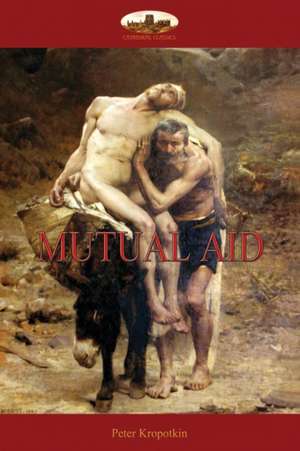Mutual Aid
Autor Peter Kropotkinen Limba Engleză Paperback – 22 sep 2017
Kropotkin does not deny the existence of competition between individuals and groups, but amasses an overwhelming body of evidence that reveals mutual aid as an important factor in evolution. Individuals of sociable species prosper, develop and reproduce successfully because of their cooperation. And Humanity is no exception - in a comprehensive review of human society, both historical and contemporary, Kropotkin shows the vital importance of mutual support in the evolution of everything from tribal life to the development of cities, science and art. Anthropologist Ashley Montagu considered "no book in the whole realm of evolutionary theories more readable or more important..."
| Toate formatele și edițiile | Preț | Express |
|---|---|---|
| Paperback (5) | 53.68 lei 26-32 zile | +19.94 lei 7-13 zile |
| Penguin Books – 9 iul 2024 | 53.68 lei 26-32 zile | +19.94 lei 7-13 zile |
| PM Press – 11 noi 2021 | 190.30 lei 3-5 săpt. | +42.99 lei 7-13 zile |
| AZILOTH BOOKS – 22 sep 2017 | 78.26 lei 6-8 săpt. | |
| COSIMO CLASSICS – 31 iul 2009 | 114.41 lei 6-8 săpt. | |
| Martino Fine Books – 13 feb 2017 | 134.56 lei 38-44 zile | |
| Hardback (2) | 232.35 lei 6-8 săpt. | |
| PM Press – 11 noi 2021 | 377.80 lei 26-32 zile | |
| COSIMO CLASSICS – 31 iul 2009 | 232.35 lei 6-8 săpt. |
Preț: 78.26 lei
Nou
Puncte Express: 117
Preț estimativ în valută:
14.97€ • 15.68$ • 12.39£
14.97€ • 15.68$ • 12.39£
Carte tipărită la comandă
Livrare economică 05-19 aprilie
Preluare comenzi: 021 569.72.76
Specificații
ISBN-13: 9781911405443
ISBN-10: 1911405446
Pagini: 196
Dimensiuni: 152 x 229 x 11 mm
Greutate: 0.29 kg
Editura: AZILOTH BOOKS
ISBN-10: 1911405446
Pagini: 196
Dimensiuni: 152 x 229 x 11 mm
Greutate: 0.29 kg
Editura: AZILOTH BOOKS
Notă biografică
The fascinating story of a Russian prince-turned-anarchist, Peter Kropotkin (1842-1921). Kropotkin one of the world's first international celebrities. In England, Kropotkin was known as a brilliant scientist, famous for his work on animal and human cooperation, but Kropotkin's fame in continental Europe centered more on his role as a founder and vocal proponent of anarchism. In the United States, he pursued both passions. Tens of thousands of people followed ex-Prince Peter during two speaking tours in America.Kropotkin's path to fame was unexpected and labyrinthine, with asides in prison, breathtaking 50,000-mile journeys through the wastelands of Siberia, and banishment, for one reason or another, from most respectable Western countries of the day. In his homeland of Russia, Peter went from being Czar Alexander II's favored teenage page, to a young man enamored with the theory of evolution, to a convicted felon, jail-breaker and general agitator, eventually being chased halfway around the world by the Russian Secret police for his radical-some might (and did) say enlightened-political views.Both while in jail, and while on the run when he was entertaining and enlightening huge crowds, Kropotkin found the energy and concentration to write books on a dazzling array of topics: evolution and behavior, ethics, the geography of Asia, anarchism, socialism and communism, penal systems, the coming industrial revolution in the East, the French Revolution, and the state of Russian literature. Though seemingly disparate topics, a common thread-the scientific law of mutual aid, which guided the evolution of all life on earth-tied these works together. This law boils down to Kropotkin's deep-seated conviction that what we today would call altruism and cooperation-but what the Prince called mutual aid-was the driving evolutionary force behind all social life, be it in microbes, animals or humans. Today, anthropologists, political scientists, economists and psychologists publish hundreds of studies each year on human cooperation, and researchers in these fields are just beginning to realize that so many of the topics they are investigating were first suggested and promulgated by Peter Kropotkin.


















